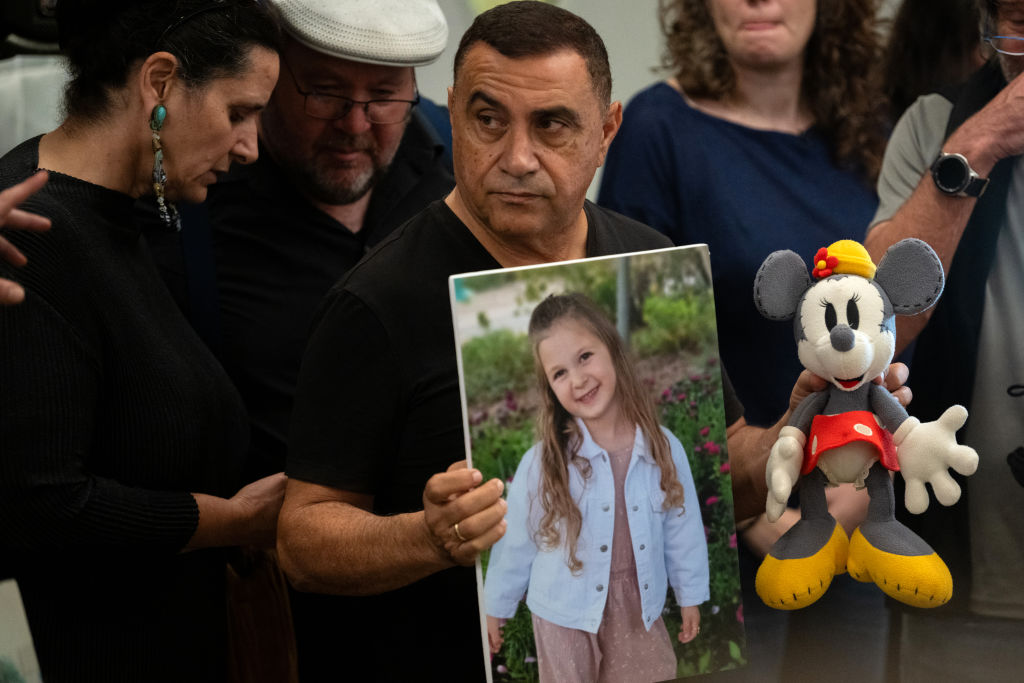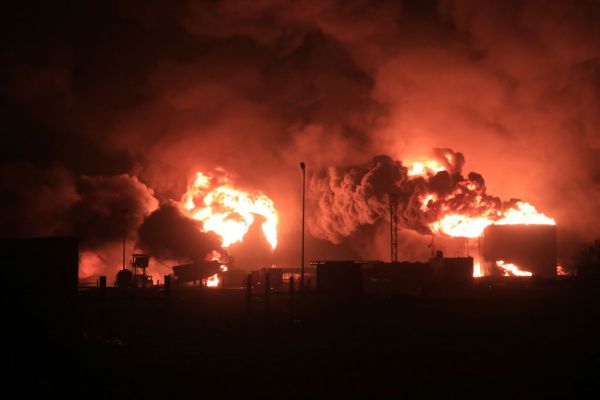“We are writers and artists who have been to Palestine to participate in the Palestine Festival of Literature.” So begins an “An Open Letter from Participants in the Palestine Festival of Literature” published in the latest edition of The New York Review of Books.
It continues with the self-anointed self-seriousness that is normally reserved for critical theory syllabi controversies or faculty parking disputes: “We now call for the international community to commit to ending the catastrophe unfolding in Gaza and to finally pursuing a comprehensive and just political solution in Palestine.”
This made me wonder a few things. First, is there some The Poseur Radical’s Style Guide for Dummies out there that mandates such headline-topic sentence redundancy?
Headline: “An Open Letter from the Members of the Lollipop Guild”
Lead sentence: “We are members of the Lollipop Guild.”
Second, do the authors—or anyone else save perhaps some grad student with an unhealthy crush on one of the authors—think that there is a person of any power, influence, or responsibility over any issue relating to Israel, Gaza, or the Middle East who, upon hearing that some past attendees of the Palestine Festival of Literature have announced their demands, will do anything differently?
“Prince Bin Salman! Have you heard? They’ve broken their silence!”
“Who?”
“Look, your excellency,” the Saudi foreign minister said, handing his personal copy of The New York Review of Books to the crown prince.”
“Finally. This changes everything.”
I know this story is now a few days old, but I’m just fascinated by the disconnect between the assertion of soaring rhetorical authority and the wet smacking thud of the authors’ actual authority as it hits the concrete of reality—like a cartoon hippo attempting to leap a canyon on a tricycle or Vivek Ramaswamy talking about nearly anything.
The statement calls to mind such classic statements of the genre as:
“We are orthodontists and chiropodists who have been to the Kennedy Space Center in Florida. We now call for a total reevaluation of rocket science.”
“We are members of the San Demas High School Chess and Computer Science Club, we played paintball last weekend, and we call for a complete revolution in military doctrine.”
I particularly like the signatories’ faux modesty when they say, “Our words feel small in this terrifying escalation.” It’s almost like they expect someone to say, “No, no, your words matter now more than ever.” But they were right the first time. Their words are small; it is their self-regard that is very large.
This argumentum-ad–I-stayed-at-a-Holiday-Inn-Express-Last-Night would be funny if so much of the substance of the letter wasn’t so grotesque and the presumptions behind it so arrogant. Actually, strike that. It is funny. It’s also pro-Hamas propaganda. As Dan McLaughlin notes at National Review, the repeated use of “Palestine” is a deliberate attempt to erase the existence of Israel as a legitimate society of any kind—even though many of the events for this festival you never heard of took place in Israel. To suggest that Haifa and Jerusalem are part of “Palestine”—not in the geographic sense, but in the Hamas-ian sense—is to suggest that there is not, or should not be, a country called Israel at all.
The letter is full of the “euphemism, question-begging and sheer cloudy vagueness” George Orwell skewered in Politics and the English Language some eight decades ago: “On Saturday, after sixteen years of siege, Hamas militants broke out of Gaza. More than 1,300 Israelis were subsequently killed with over one hundred more taken hostage.”
I for one would be pretty pissed if a friend or family member used such passive language to describe the actions of the savages who murdered me or took me hostage. Heck, I’d be pissed if I was one of the savages who relished in slaughtering those Jews. “What’s this ‘subsequently killed’ crap? We did this! Give us credit. Those kids and grandmothers didn’t have an accident.”
But hey, that’s me. I haven’t received the higher wisdom that comes from sitting on a panel at a literary festival or hanging out in a green room with all of the hummus you could ever want.
I could go on. But Dan does a fine job taking this thing apart and I want to move on.
Speaking truth to everybody.
The signatories are but a small slice of a whole unpopular front of intellectuals who think they are following some holy writ to “speak truth to power.” At least that used to be the trade euphemism for a broad menu of radical poses. These days you don’t hear it much over the din of “Free Palestine,” “Glory to the Martyrs!” or “Gas the Jews.” But it’s the mode in which all of these cowardly radicals were trained to “think.”
I’ve always had a problem with “speaking truth to power.”
I’m not against it per se. I just don’t really understand why you need all four words when the first two will do just fine. And that’s part of my problem. “Speak truth to power” is a rhetorical smuggler’s trick, like a heroin-filled balloon in the rectum, that hides all manner of assumptions, starting with the claim that those doing the speaking have special insight into—or even possession of—the actual truth. Indeed, the vast majority of people who use the phrase come from a school of post-this or post-that thought that literally questions the existence of truth. If perception is reality, everything is relative, and all claims of fact are actually efforts at manufacturing consent, why not talk about “hurling aardvarks to power” or “speaking truth to fluoride”?
The funny thing is that while they question the existence of truth, they never doubt the existence of power. And they think those with power really need to be told what’s what by people like them. Which brings me to my biggest problem with the whole speaking-truth-to-power racket. Implicit in the idea is the notion that the “powerless” never need to hear any hard truths. Whatever faults the powerless may have, talking to them about those faults or mistakes is just victim-blaming. That’s why so many of these people just don’t want to hear about Hamas’ actual responsibility, its agency, its crimes—because any evil Hamas does is actually the evil that the Zionist colonizers made them do.
I have very little use for, or patience with, Noam Chomsky, but at least he got closer to comprehending the problem than a lot of his radical confreres. “Speaking truth to power makes no sense. There’s no point in speaking truth to Henry Kissinger, he knows it already. Instead speak truth to the powerless. Or better, with the powerless. Then they’ll act to dismantle illegitimate power.”
Chomsky is entirely correct to distinguish illegitimate power from legitimate power. The rub is that he’s always had a thumbless grasp of what actually constitutes legitimate and illegitimate power. “If you want to rank evils,” he said a few years ago, “the United States and Britain are so far higher than anyone else that we can put all the others to the side.”
Just to be clear, that’s not just a wrong opinion. It’s not just a stupid opinion. It is an opinion so stupid, and so wrong, it’s morally hallucinatory. Taking it seriously is like arguing whether Dali’s melting clocks are reliable timepieces. Chomsky has spent his entire life taking the side, to one extent or another, of any country that hates America (he recently suggested that Ukraine is fighting Russia because we want them to and that Russia is showing admirable military restraint in Ukraine). So even though he disagrees with the “speak truth to power” formulation, he shares the view that the powerless have all the virtue and righteousness on their side. And that, too, is stupid, and wrong, and hallucinatory.
I don’t have time to pick the corn kernels out of gargantuan logs of Marxian bulls–t. But just for clarity’s sake: All societies have differentials in power. Very few can be described in the cartoonish binary of “the powerful” and the “powerless.” Power is a very, very, diversely distributed, horizontally and vertically, across communities and institutions. A neighborhood thug with a gun may be counted as a member of the “powerless” in the Chomskyite version of reality, but he doesn’t seem so powerless when his gun is pointed at your head. The murderers who ignored the pleas from desperate mothers are quintessentially powerless according to this crowd, but that just shows you how incredibly untethered from reality the self-anointed truth-tellers are.
To be coldly blunt about it: “Powerless” people can be awful. They can be cruel and vicious. They can do unspeakable things. So can people with a little bit of power. Some of the worst crimes are committed by those who want to demonstrate their dominance over the poor souls just one rung down the ladder. And sometimes the worst crimes are committed by people who think they have an excuse to exact revenge on people a few rungs above them. Poor white farmers visited horrors on poorer black ones. Poor Russian peasants leapt at the opportunity to punish ever-so-slightly more prosperous “kulaks.”
Everyone loves to talk about how power corrupts. But “powerlessness” can corrupt even more. Hamas is a ghoulish, criminal band of medieval zealots. And while those in the speak-truth-to-power crowd don’t like to hear this truth, they also largely agree with it if you listen to them. After all, the whole obsession with powerlessness is just another “root causes” explanation for inconvenient, embarrassing, or damning behaviors by the “downtrodden.” Root causes explanations sometimes have more analytical power than conservatives are willing to concede. But on one point the root-causers are almost always and entirely wrong: Explanations aren’t excuses.
“Poverty causes crime,” they exclaim. Yes, there is a significant correlation there. There’s also a significant correlation going the other direction; crime causes poverty.
“Powerlessness fuels terrorism,” they insist. Okay, debatable. Sometimes, for sure. Other times, not so much. There are lots of powerless folks out there. Not all of them become suicide bombers or set fire to families. But let’s say it’s true.
But here’s the thing: Poverty doesn’t excuse crime. Powerlessness doesn’t justify terrorism.
And you know who needs to hear that truth? Criminals and terrorists, for starters.
But more broadly, “powerless communities”—I’m sorry, but I just have to use scare quotes there—are often the most in need of hearing unpleasant or uncomfortable truths, because such truths will set them free. I don’t mean in a Christian or religious sense, but as an empirical matter, a lot of lost and alienated people would be well-served to embrace some of that stuff. The “powerless” need to hear that they are individuals, not members of a condemned caste of victims. That they have choices, agency, options, and that wallowing in victimhood is the psychological equivalent of a turtle making peace with being stuck on its back. You know that whole “give a man a fish, he eats for a day. Teach a man a fish he eats for life” thing? That’s a parable about speaking truth to the powerless.
The “powerless” people fetishized by the Chomskyites and The Elders of the Palestine Literary Festival need to hear the truth that they cannot—or at least should not—try to murder, rape, and torture their way to power. And the fetishizers need to hear that just because they have dog-eared copies of Frantz Fanon’s The Wretched of the Earth, the margins full of exclamation points and smiley faces, not only that being powerless isn’t a justification for murder, rape, or torture but also that being a cheerleader for murderers and rapists is evidence you are utterly unqualified to distinguish between “legitimate” and “illegitimate” power. The Palestinian people have been cursed with “leaders” who have little interest in the legitimate use of political power. And the cheerleaders, at every turn, not only blame the Jews for it, but are exhilarated—literally a quote from a Cornell professor—when Palestinians translate that blame into bloodshed.
Indeed, I’ve long thought that one of the things that arouses so much irrational hatred of Jews is the way they have demonstrated, over and over again, that victimhood is not a permanent anchor, that oppression need not be an iron cage. To borrow the language of the people who think losing a job offer is “violence” but cutting off a Jew’s head is the dialectical unfolding of justice, the truth of Jewish success and perseverance does violence to the whole “speak truth to power” paradigm.









Please note that we at The Dispatch hold ourselves, our work, and our commenters to a higher standard than other places on the internet. We welcome comments that foster genuine debate or discussion—including comments critical of us or our work—but responses that include ad hominem attacks on fellow Dispatch members or are intended to stoke fear and anger may be moderated.